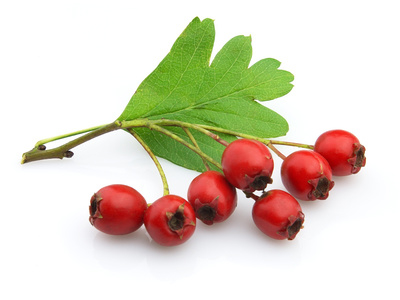Contents
Uses
- Hawthorn is used for diseases of the heart and blood vessels such as congestive heart failure (CHF), chest pain, and irregular heartbeat. It is also used to treat both low blood pressure and high blood pressure, “hardening of the arteries” (atherosclerosis), and high cholesterol. So far, research suggests that hawthorn might be effective in treating congestive heart failure, but there hasn’t been enough research on other heart-related uses to know if it is effective for them.
- Some people use hawthorn for digestive system complaints such as indigestion, diarrhea, and stomach pain. It is also used to reduce anxiety, as a sedative, to increase urine output, and for menstrual problems.
- Hawthorn is also used to treat tapeworm and other intestinal infections.
- Some people apply hawthorn to the skin for boils, sores, and ulcers. Hawthorn preparations are used as a wash for sores, itching, and frostbite.
- You will find hawthorn among the ingredients in candied fruit slices, jam, jelly, and wine.
Benefits
- Hawthorn can help improve the amount of blood pumped out of the heart during contractions, widen the blood vessels, and increase the transmission of nerve signals.
- Hawthorn also seems to have blood pressure-lowering activity, according to early research. It seems to cause relaxing of the blood vessels farther from the heart. It seems that this effect is due to a component in hawthorn called proanthocyanidin.
- Research suggests that hawthorn can lower cholesterol, low density lipoprotein (LDL, or “bad cholesterol”), and triglycerides (fats in the blood). It seems to lower accumulation of fats in the liver and the aorta (the largest artery in the body, located near the heart). Hawthorn fruit extract may lower cholesterol by increasing the excretion of bile, reducing the formation of cholesterol, and enhancing the receptors for LDLs. It also seems to have antioxidant activity.
Cautions
- Before taking hawthorn, talk with your healthcare professional if you take any medications. It has major interactions with several prescription medications.
- Hawthorn is POSSIBLY SAFE for most adults when used at recommended doses short-term (up to 16 weeks). It is not known whether hawthorn is safe when used long-term.
- In some people, hawthorn can cause nausea, stomach upset, fatigue, sweating, headache, dizziness, palpitations, nosebleeds, insomnia, agitation, and other problems.
- Pregnancy and breast-feeding: Not enough is known about the use of hawthorn during pregnancy and breast-feeding. Stay on the safe side and avoid use.
- Heart disease: Hawthorn can interact with many prescription drugs used to treat heart disease. If you have a heart condition, don’t use hawthorn without the recommendation of your healthcare provider.
Interactions
Major Interaction Do not take this combination:
- Digoxin (Lanoxin) interacts with HAWTHORN:Digoxin (Lanoxin) helps the heart beat more strongly. Hawthorn also seems to affect the heart. Taking hawthorn along with digoxin (Lanoxin) might increase the effects of digoxin and increase the risk of side effects. Do not take hawthorn if you are taking digoxin (Lanoxin) without talking to your healthcare professional.
- Medications for high blood pressure (Beta-blockers) interacts with HAWTHORN:Hawthorn might decrease blood pressure. Taking hawthorn along with medication for high blood pressure might cause your blood pressure to go too low.
- Some medications for high blood pressure include atenolol (Tenormin), metoprolol (Lopressor, Toprol XL), nadolol (Corgard), propranolol (Inderal), and others.
- Medications for high blood pressure (Calcium channel blockers) interacts with HAWTHORN:Hawthorn might decrease blood pressure. Taking hawthorn along with medication for high blood pressure might cause your blood pressure to go too low.
- Some medications for high blood pressure include nifedipine (Adalat, Procardia), verapamil (Calan, Isoptin, Verelan), diltiazem (Cardizem), isradipine (DynaCirc), felodipine (Plendil), amlodipine (Norvasc), and others.
- Medications for male sexual dysfunction (Phosphodiesterase-5 Inhibitors) interacts with HAWTHORN:
Hawthorn might decrease blood pressure. Some medications for male sexual dysfunction can also decrease blood pressure. Taking hawthorn along with medications for male sexual dysfunction might cause your blood pressure to go too low.
-
- Some medications for male sexual dysfunction include sildenafil (Viagra), tadalafil (Cialis), and vardenafil (Levitra).
- Medications that increase blood flow to the heart (Nitrates) interacts with HAWTHORN: Hawthorn increases blood flow. Taking hawthorn with medications that also increase blood flow to the heart might increase the chance of dizziness and lightheadedness.
- Some of these medications that increase blood flow to the heart include nitroglycerin (Nitro-Bid, Nitro-Dur, Nitrostat) and isosorbide (Imdur, Isordil, Sorbitrate).
References
Source: WebMD, “Hawthorn”, www.webmd.com/vitamins-supplements


We’re a group of volunteers and opening a brand new scheme in our community. Your site offered us with useful information to paintings on. You’ve performed a formidable job and our entire group can be thankful to you.